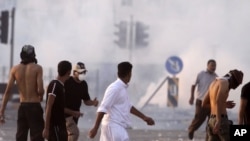Tensions are mounting in Bahrain ahead of planned parliamentary elections next week, with opposition supporters vowing to hold a mass demonstration in the capital, Manama.
Next Saturday’s poll will fill 18 seats abandoned by members of the main opposition al-Wefaq party, who quit in February over the government’s bloody crackdown on pro-democracy demonstrators.
Mattar Mattar, one of the legislators who resigned, says the decision to replace all of the opposition parliamentarians is proof that the nation’s leaders are neglecting the grievances of the people. "They are trying to ignore us, but this plan will not succeed. They are going on the wrong track. Without opening a real dialogue and without going for real political reform it’s difficult to reach stability here," he said.
Bahrain's political opposition comprises, in large part, the nation’s majority Shi’ite Muslims, who say they are treated like second-class citizens by the ruling Sunni minority. They have been calling for more rights and for the introduction of a constitutional monarchy.
Some hardliners in the opposition have been demanding the abolition of the monarchy, and as unrest continues, their numbers are growing.
Clashes between security forces and anti-government protesters take place nearly every night in Shi’ite neighborhoods.
According to rights groups, about 40 people have been killed and more than a thousand detained since February. The government has defended the crackdown, saying it is needed to reinstate stability.
On Friday, tear gas, rubber bullets and stun grenades were used to disperse tens of thousands of mourners at a funeral in Sitra, south of Manama.
The grief stricken shouted anti-government slogans. Relatives of the deceased say the man died earlier in the week after inhaling teargas shot into the home of his parents.
Saeed Alawi was among the crowd. “All these people are coming to express that we refuse and reject all this crime against humans. That’s why they are insisting to send a message to the government that the political issue cannot be solved by the security [forces]," he said.
Forty-seven-year-old Salman Ahmed was caught up in the tear gas and had to take refuge in a stranger’s home. "We are peaceful. We are not killing anybody. And we want to save our lives," he said.
Most analysts, like Nabeel Rajab, the president of the Bahrain Center for Human Rights, say the use of force by authorities is only strengthening the resolve of many opposition supporters to continue protesting. He says stability will only be achieved when the government and the opposition engage in meaningful dialogue.
"This is what every day Bahrainis have to witness and have to see. And this is what is not going to make the situation be better and this is, for sure, not going to make Bahrainis quiet," he said.
In July, the government opened a national dialogue in a bid to ease months of fighting and restore confidence in the kingdom’s commitment to work out its troubles. However, the opposition al-Wefaq party quickly quit the talks, saying their demands had been ignored.
Youth groups have utilized social media to attract support for a number of demonstrations in the lead up to next week’s elections, including a protest at the Pearl Roundabout site in Manama that has become symbolic with Bahrain’s opposition movement.
Tensions Rise Ahead of Bahrain Elections




